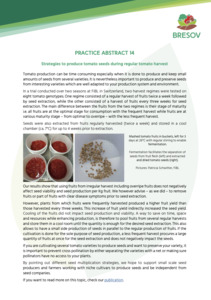{Tool} Strategies to produce tomato seeds during regular tomato harvest (BRESOV Practice Abstract). Creator(s): Herforth-Rahmé, Joelle and Schwitter, Patricia. Issuing Organisation(s): FiBL - Research Institute of Organic Agriculture. Bresov practice abstracts, no. 14. (2022)
|
PDF
- Submitted Version
- English
138kB | |
![[thumbnail of Screenshot 2022-12-05 at 11.57.57 AM.png]](/44659/3.hassmallThumbnailVersion/Screenshot%202022-12-05%20at%2011.57.57%20AM.png)  Preview |
Image (PNG)
- Cover Image
- English
635kB |
Summary in the original language of the document
Tomato production can be time consuming especially when it is done to produce and keep small amounts of seeds. In a trial conducted over two seasons at FiBL, CH, two harvest regimes were tested on 8 tomato genotypes. One regime consisted of a regular harvest of fruits twice a week followed by seed extraction, while the other consisted of a harvest of fruits every three weeks for seed extraction. The main difference between the fruits from the two regimes is their stage of maturity i.e. all fruits are at the optimal stage for consumption with the frequent harvest while fruits are at various maturity stage – from optimal to overripe – with the less frequent harvest. Seeds were also extracted from fruits regularly harvested and stored in a cool chamber (ca. 7°C) for up to 4 weeks prior to extraction.
Using fruits from irregular harvest including overripe fruits did not negatively affect seed viability and seed production /Kg fruit. However, fruits or part of fruits with clear disease symptoms should be removed prior to seed extraction. Plants frequently harvested produced a higher fruit yield than those harvested every three weeks which indirectly increased the seed yield. Cooling of the fruits had no impact on seed production and viability. A way to save on time, space and resources while enhancing production, is thus to pool fruits from several regular harvests and store them in a cool room until the quantity is enough for the seed extraction. This also allows to have a small side production of seeds in parallel to the regular production of fruits. In cultivations aimed only at seed production, a less frequent harvest procures a large quantity of fruits at once for the extraction and have no negative impact on seeds.
| EPrint Type: | Practice tool |
|---|---|
| Teaser: | Learn how to produce and preserve seeds from interesting, locally adapted varieties |
| What problem does the tool address?: | The effect of harvest frequency on the production of tomato seeds. |
| What solution does the tool offer?: | Effective strategies include: - frequent harvesting of fruits increases fruit production and therefore seed production. - frequently harvested fruits can be stored for several weeks in cool chambers to make a pooled seed extraction. - for larger seed extractions, an infrequent harvest does not negatively affect seed production. |
| Country: | Switzerland |
| Type of Practice Tool: | Practice abstracts |
| Keywords: | seed production, organic agriculture, tomato, seed extraction, tomato breeding, fruit maturity stage, post-harvest cooling, harvest frequency, Abacus, FiBL2505506 |
| Agrovoc keywords: | Language Value URI English vegetables http://aims.fao.org/aos/agrovoc/c_8174 English seed production http://aims.fao.org/aos/agrovoc/c_6937 |
| Subjects: | Crop husbandry Crop husbandry > Breeding, genetics and propagation Crop husbandry > Post harvest management and techniques |
| Research affiliation: | Switzerland > FiBL - Research Institute of Organic Agriculture Switzerland > Crops > Special crops > Vegetables European Union > Horizon 2020 > BRESOV European Union > Organic Farm Knowledge |
| Horizon Europe or H2020 Grant Agreement Number: | 774244 |
| Related Links: | https://organic-farmknowledge.org/tool/44659, https://organic-farmknowledge.org/tool/40267, https://organic-farmknowledge.org/tool/44052, https://organic-farmknowledge.org/tool/39812, https://organic-farmknowledge.org/tool/37904, https://twitter.com/farm_knowledge/status/1613463977643720704, https://www.facebook.com/organicfarmknowledge/posts/pfbid02Pt6NeW5JYzm4sUCStsEBRGb6CLLfyE4ijWrHWRFoXGKVL2HHoALtREqHUoG7ghSVl |
| Project ID: | ofk |
| Deposited By: | Herforth-Rahmé, Dr. Sc. Joelle |
| ID Code: | 44659 |
| Deposited On: | 05 Dec 2022 11:03 |
| Last Modified: | 02 May 2024 10:32 |
| Document Language: | English |
| Status: | Published |
Repository Staff Only: item control page


